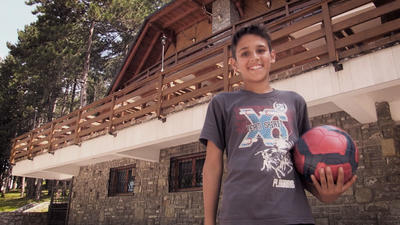After witnessing the massacre of their relatives and neighbours in Central African Republic (CAR), people are arriving both physically and mentally exhausted in Chad.
Packed into trucks, their torturous journeys have lead them several hundred kilometers from Bangui to Sido, on the border of CAR.
Dr Frédérique Drogoul, an Médecins Sans Frontières/Doctors Without Borders (MSF) psychiatrist, talks about these lives torn apart by violence and exile.
Painful memories
“Most of the refugees who told me their stories did so in a monotone, with solemn faces, without going into details about the bodies carved up in the massacres, keeping their distance from the expression of painful emotions.
“‘You have to bottle things up, otherwise you go mad,’ a man whose wife and children had been savagely killed, told me.” Dr Frédérique Drogoul is returning from Sido, where MSF opened a health centre and a hospital unit in early February to meet the urgent medical needs of some 13,000 refugees relocated to this town on the border of CAR.
“Despite the terrible stories I heard throughout my visit, I often had the feeling that the painful memories were being held in check by a staggering effort,” Frédérique said.
That was the case with the grandmother of Abdel and Zacharia, two brothers about 20-years-old. “She was as if detached.”
Residents of the “kilo 5” neighbourhood of Bangui arrived in Sido in one of the convoys organised by the Chadian army.
Listen to an interview with Frédérique on BBC Newsday
“Decapitated before his eyes”
Twenty-eight of their family members had been massacred. “When I met him, Abdel was really not there. He was sitting down and mumbling from time to time.
"His grandmother told me that, when his older brother was decapitated before his eyes, Abdel ran out screaming. He has not recovered since,” Frédérique said.
Zacharia, Abdel’s younger brother, was not with them at the time. He was working in his shop, which was also attacked.
He said that the anti-balakas tied up his arms before throwing a grenade into the shop. Part of his right hand was torn off and he was hit in the right eye.
“A very heavy burden”
“Zacharia was reunited by chance with his grandmother and Abdel in Sido.
“Now he is anxious, exhausted, worried about his grandmother, who is not able to do very much, and has a brother who is psychotic and no longer self-sufficient. It’s a very heavy burden for him.”
The family is being supported and receiving medical help from the MSF team in Sido.
Children arriving alone
About 100 kilometres from Sido, at Doyaba, a special reception site has been set up for unaccompanied minors, that is, all the children who arrive alone, completely separated from their families.
There are around 400 children here, but a little over 1,000 throughout southern Chad, according to UNICEF.
Four young brothers who have been in care for several weeks at Doyaba had arrived via Sido with wounds from machete blows on the skull and, for two of them, their fingers deliberately mutilated.
“The two older ones, who are seven and eight-years-old, seem to be getting better.
“The wounds have healed and they play quietly with the other children. However, the two younger ones are isolated, withdrawn and still stare blankly.”
Nearly 40,000 people have arrived or passed through Sido, Chad, fleeing the violence in CAR © Samantha Maurin/MSF
Reuniting families
In addition to the trauma of the violence suffered in CAR, there is also the trauma of family separation.
For Frédérique, it is essential to work towards reuniting families.
This has been done by examining the lists drawn up by UN agencies in Chad and CAR or by setting up telephone booths, as the International Confederation of the Red Cross has already done in Goré and Doyaba, to enable people to call their relatives or neighbours and to re-establish contact with those they have lost.
“It’s survival from day to day. There is little room for memories of terror, no space to imagine a future for oneself.
“To have survived and managed to protect one’s children is what counts above all now.
“But when the minimum conditions for survival are finally provided to the refugees, it is likely that situations of great distress, even of psychic collapse, will become more frequent.”
MSF in Chad
MSF has been operating in Chad for over 30 years. In addition to emergency programs established in February in N’Djamena, Bitoye, Goré and Sido to meet the medical and humanitarian needs of the refugees from the Central African Republic, MSF teams operate regular programs in Abéché, Am Timan, Massakory, Moissala and Tissi.





